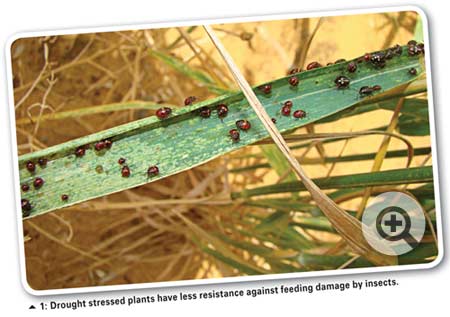September 2014
ASTRID JANKIELSOHN, ARC-Small Grain Institute
Impacts of global climate change can be observed in many places, from rising sea levels to melting snow and changing weather patterns, but the effects on agro-ecosystems are one of the biggest concerns as this will impact food security.
Maintaining food security is already becoming more of a challenge for smallholder and commercial farms alike, but poorer people are more vulnerable and will suffer most from the negative impacts thereof. Climate change causes highly variable conditions including higher temperatures and a shift of seasons as well as changes in atmospheric gas composition (CO2 levels), changes in rainfall, variation in water availability and extreme natural events. All these changes will have a significant impact on agriculture.
An important aspect to consider is the role of insect pests within a changing environment in crop production systems. Insects are strongly influenced by climate and weather because they are cold-blooded.
Temperature, precipitation, humidity, wind speed and other climatic parameters directly influence insect pests by affecting their rate of development, reproduction, distribution, migration and adaptation. Climate will also affect the insects’ interactions with their host plant/s. Because most insects have short generation times and are highly adaptive, they will be able to rapidly exploit changing environmental conditions and impact agro-ecosystems in different ways.
Increased temperatures
An increase in temperature may result in the extension of the geographical range of some insect pests.
The risk of invasion by migrant pests will hereby be increased and in turn result in pest insects causing damage to crops in areas where they did not before. A shift in seasons may result in a shorter overwintering period, reduced overwintering mortality and the extension of the development season.
This will result in an increased number of generations, consequently leading to increased insect pressure on the emerging crops in the following season. Some pests which are already present, but only occur in small areas or at low densities, may be able to exploit the changing conditions by spreading more widely and reaching damaging population densities.
Aphids, for instance, are key pests of agriculture throughout the world and are expected to be particularly responsive to climate change, because of their low developmental threshold temperature, short generation time and considerable dispersal abilities.
Changes in temperature will also result in changes in interspecific interactions and crop-pest synchrony. Differences in patterns of response to temperature change among insect species may affect relationships within food webs (host, pest and natural enemy). This could result in the emergence of new pests or the new balance may even favour the build-up of natural enemy populations.
Pest insects may also be influenced by the introduction of new alternative hosts and “green bridges” or overwintering hosts as a result of changing temperatures.
Increase in CO2 levels
A change in the concentration of CO2 levels is likely to bring about changes in the quality of plant species, which may in turn affect insect pests feeding on these plants. Increased levels of atmospheric carbon will result in greater carbon:nitrogen-ratios in plant foliage, which could stimulate increased feeding activity in some herbivores and lead to greater crop damage.
 Changes in rainfall patterns
Changes in rainfall patterns
Rainfall pattern changes can have substantial effects on insect populations. Droughts make plants more nutritious to pests, as the lack of water concentrates the amino acids. Aphids can flourish during short droughts as plant nutrients become more concentrated. Drought stressed plants also have less resistance against feeding damage by insects (Photo 1). Predators and parasites of pests are furthermore affected by drought, such as insect-killing fungi that require humidity to germinate and are generally less effective during droughts.
Extreme events
Extreme parameters can include temperature, precipitation, wind, light, humidity or any unusual sequences of such extremes or unusual combinations. Extreme events have an impact on pest incidence in the short term. Rapid changes in the climate caused by extreme events can lead to sudden pest outbreaks that can lead to yield losses due to the difficulty of applying control measures fast enough or on a large enough scale to contain the problem.
Crop-pest interactions
Many crops in agro-ecosystems have been selected for pest resistance and have specific traits that reduce pest damage. Climate change may compromise crop resistance to pests through elevated CO2 causing a down-regulation of genes or altering the production of volatile defence compounds resulting in an increased susceptibility in crops. Elevated CO2 can also affect the production of plant secondary compounds impacting crop-pest interactions.
Mitigation through farming practices
The type and extent of insect-related problems due to climate change will depend on the specific region and crop, and problems will have to be addressed regionally for specific situations. An improved understanding of the interactive relationships between pests, their hosts and climate, is necessary to develop crop-pest models for each specific region, while monitoring is essential to provide indications of a response to changes in the climate.
Using local biodiversity and ecosystem functions to enhance productivity and understanding, the local agro-ecological balance will become critical to ensure food security in a changing environment. Resilience is the ability of a system to cope with or return to balance after a stress and to regain the capacity to produce important services. It is a fundamental feature of natural systems allowing them to cope with change. There is a need to restore and enhance resilience in agro-ecosystems.
Management strategies and crop land mitigation include the following:
Understanding and managing local resilience in their own fields will be the best option that producers have to face changes and minimise vulnerabilities in their agricultural systems.
Producers with queries or comments can contact Dr Astrid Jankielsohn at the ARC-Small Grain Institute at 058 307 3431 or jankielsohna@arc.agric.za.
Publication: September 2014
Section: Focus on